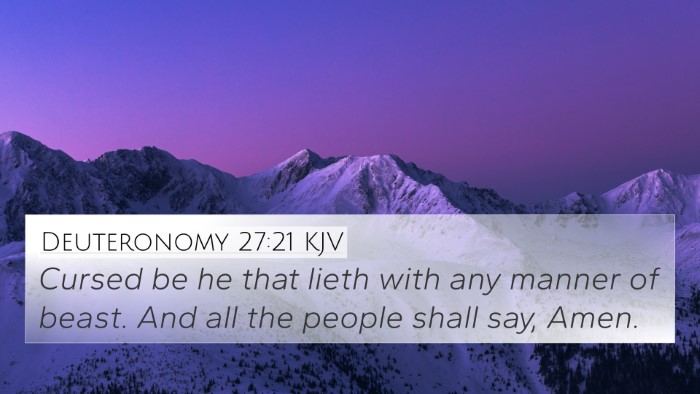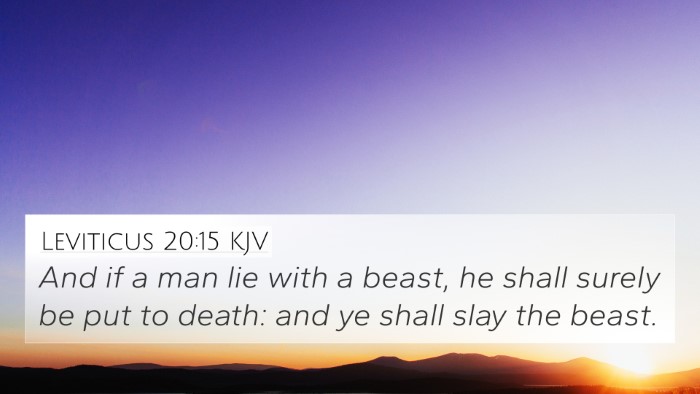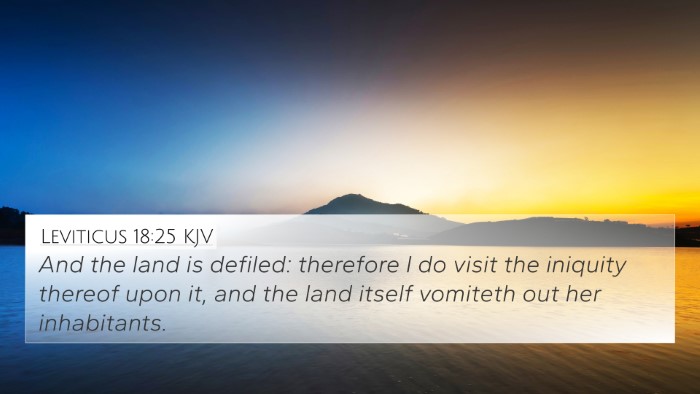Exodus 22:19 - Biblical Interpretation and Meaning
Verse: "Whosoever lieth with a beast shall surely be put to death."
Understanding the Context
Exodus 22:19 falls within a section of laws given to the Israelites that govern various aspects of social behavior, morality, and justice. This specific verse addresses an egregious act that was considered not only immoral but also a defiling act against the created order. The harshness of the punishment reflects the seriousness of the offense in the covenant community of Israel.
Commentary Insights
Matthew Henry's Commentary
Matthew Henry emphasizes the gravity of bestiality as a sin that corrupts natural order and opposes divine law. He points out that the severe consequences serve as a deterrent and maintain the integrity of human morality.
Albert Barnes' Notes
Albert Barnes elaborates on the societal implications of such acts, noting that they undermine family structure and the sanctity of human relationships. Barnes identifies that the punishment of death serves to demonstrate God's holiness and the seriousness with which He views such transgressions.
Adam Clarke's Commentary
Adam Clarke focuses on the cultural background of the ancient Near East, noting that such prohibitions were not unique to Israelite law but were also found in the legal codes of neighboring cultures. Clarke points to the necessity of these laws to protect the community's moral fabric and security.
Bible Verse Cross-References
This verse can be cross-referenced with several other passages that reinforce the themes of morality, divine law, and punishment for heinous sins:
- Leviticus 18:23: "Neither shalt thou lie with any beast to defile thyself therewith." - This reinforces the prohibition against bestiality.
- Leviticus 20:15-16: Discusses the punishment for bestiality, emphasizing the seriousness of the act.
- Deuteronomy 22:5: Addresses cross-dressing, highlighting the importance of maintaining gender distinctions, contributing to societal morality.
- Romans 1:24-27: Discusses the consequences of turning away from God and engaging in unnatural affections, paralleling issues of immorality.
- 1 Corinthians 5:1: Discusses immoral conduct within the church community, calling for discipline.
- Galatians 5:19-21: Lists the works of the flesh that are contrary to the spirit, serving as a moral guide for believers.
- Genesis 19:5: The account of Sodom and Gomorrah illustrates the consequences of a society steeped in moral decay and the extreme actions of divine judgment.
- Hebrews 13:4: Honoring marriage and keeping the marriage bed undefiled emphasizes the sanctity of sexual relationships.
- Ezekiel 22:11: Highlights the moral corruption present in Israel, similar to issues outlined in Exodus 22:19.
- Proverbs 6:32: "But whoso committeth adultery with a woman lacketh understanding: he that doeth it destroyeth his own soul." - This verse explores mental and spiritual consequences of sexual immorality.
Connections Between Bible Verses
To gain a comprehensive understanding of Exodus 22:19, one can explore the connections between related scriptures. Each reference sheds light on the attitudes toward immorality, the social implications of sin, and the constant call to uphold divine standards.
Thematic Bible Verse Connections
Cross-referencing these verses reveals a thematic continuity throughout the scripture. The laws outlined in the Old Testament serve as foreshadowing to the New Testament teachings that aim for a higher moral standard, signifying the transformation in the understanding of righteousness through Christ.
Using Bible Cross-References Effectively
For those studying the Bible, it is beneficial to utilize tools for Bible cross-referencing like concordances or study guides. Engaging in cross-reference Bible study helps deepen understanding and provides clarity on complex biblical themes.
- How to find cross-references in the Bible: Utilizing concordances or cross-reference guides can aid in identifying related passages for deeper study.
- Identifying connections between Old and New Testament: By examining scripture that addresses similar themes or laws, the unfolding revelation of God's morals becomes apparent.
- Dive into comparative studies: Engage with the scriptures by comparing and contrasting Pauline epistles with the Old Testament laws.
Conclusion
Exodus 22:19 serves as a critical reflection of God's standards for morality and the seriousness with which He regards disobedience to His laws. The passage, when cross-referenced and examined within the wider biblical context, reveals a holistic view of divine justice and grace. Utilizing cross-referencing methodologies enriches one's study and understanding of scripture and allows for deeper insights into the inter-Biblical dialogue regarding morality.






